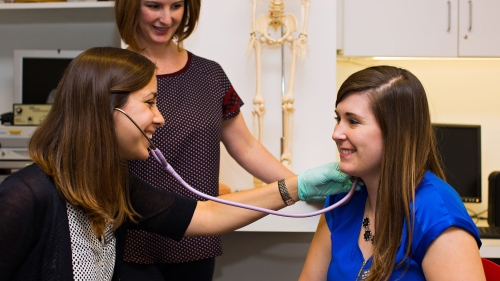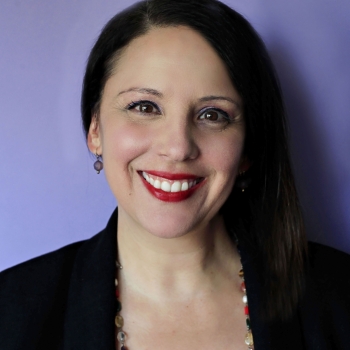

María Rosa Brea, Ph.D., CCC-SLP (ella, she, her/s), is a teacher-scholar in the Department of Communicative Sciences and Disorders, whose work has been centered at the intersection of multilingualism and disability. Her classroom and community collaborations focus on researching the impact of standardized linguistic ideologies (or beliefs of 'good' / competent communication) in speech-language practices, sustaining variability in languaging in the classroom, and co-envisioning a path for linguistic liberation through art.
Her dedication to student-centered teaching, social justice activism, and community engagement have received multiple accolades. In 2015, Dr. Brea-Spahn was selected for the University of South Florida's Provost Community Engaged Faculty Award. In 2020, she received the prestigious NYU Martin Luther King, Jr. Faculty Award. She is also the recipient of the 2021 American Speech-Language-Hearing Association (ASHA)'s Certificate of Recognition for Special Contributions in Multicultural Affairs. And in 2022, she received the NYU Steinhardt Teaching Excellence Award.
Selected Publications
- Brea-Spahn, M.R., (2025). Image-in-Processing. In Robinson, O. Unfinished business and testimonies, The Journal of Deaf Studies and Deaf Education, Volume 30, Issue SI, June 2025, Pages SI1–SI6, https://doi.org/10.1093/jdsade/enaf033.
- Brea-Spahn, M.R., & Soto-Boykin, X. (2025). Imagining liberated languaging in early childhood with pre-service speech-language practitioners. In M. Beneke & H. Love (Eds.), Beyond compliance in early childhood education. (pp. 147-159). Teacher's College Press.
- Nair, V. K. K., Brea-Spahn, M. R., & Yu, B. (2025). Decolonizing Speech Language “Pathology”: Critical Foundational Concepts for Research, Pedagogy and Praxis. Journal of Critical Study of Communication and Disability, 2(2), 71-94. https://doi.org/10.48516/jcscd_2024vol2iss2.28
- Brea-Spahn, M.R., Soto-Boykin, X., Pérez, K., Pérez, S. M., Salguero Pérez, N., Anandhakrishnan, M., & Saldivar Garcia, E. (2025). Strangeness in the Looking Glass: A Tutorial for Interrogating Ideologies of “Good” Languaging in Children's Picture Books. Perspectives of the ASHA Special Interest Groups, 1-16. https://doi.org/10.1044/2024_PERSP-24-00116
- Brea-Spahn, M. R., Chen, R., & Cioffi, G. (2025). Liberating Languaging: A Pop-Up Museum Explores ‘Language-as-a-Verb’. Leader Live. Retrieved from https://leader.pubs.asha.org/do/10.1044/leader.AE.30012025.slp-academics-languaging-exhibit.28/full/
- Silliman, E. R., Bahr, R., Danzak, R., & Brea-Spahn, M. R. (2024). Finding strengths in the disciplinary writing of students with learning disabilities. Special Issue: Innovations in language and literacy for children and adolescents with language disorders. Topics in Language Disorders, 44 (2), 111. 130. https://doi.org/10.1097/TLD.0000000000000339
- Brea-Spahn,M. R., & Bauler, C. V. (2023). Where do you anchor your beliefs? An invitation to interrogate dominant ideologies of language and languaging in Speech-Language Pathology. Language, Speech, and Hearing Services in Schools, 64(3), 1-13. https://doi.org/10.1044/2023_LSHSS-22-00135
- Soto-Boykin, X., Brea-Spahn, M. R., Pérez, S., & McKenna, M. (2023). A critical analysis of state-level policies impacting racialized emergent bilinguals suspected or labeled as dis/abled. Language, Speech, and Hearing Services in Schools, 1-17. https://doi.org/10.1044/2023_LSHSS-22-00137
- Hussain, F. N., Padía, L., Brea, M. R., & Sajnani, N. (2023). Confronting Pathology by Revealing a Critical Landscape in Communication Sciences and Disorders: A Scoping Review Protocol. Journal of Critical Study of Communication and Disability, 1(2), 53-68. https://doi.org/10.48516/jcscd_2023vol1iss2.30
- Hussain, F. N., Padía, L., Brea, M. R., & Sajnani, N. (2023). Confronting Pathology by Revealing a Critical Landscape in Communication Sciences and Disorders: A Scoping Review. Journal of Critical Study of Communication and Disability, 1(2), 69-105. https://doi.org/10.48516/jcscd_2023vol1iss2.10
- Yu, B., Nair, V. K., Brea-Spahn, M. R., Soto-Boykin, X., Privette, C., Sun, L., ... & Hyter, Y. D. (2022). Gaps in Framing and Naming: Commentary to “A Viewpoint on Accent Services”. American Journal of Speech-Language Pathology, 31 (4), 1-6.
